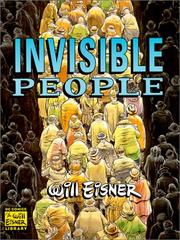This book is nicely put together, which can be especially important for graphic novels. There are no cut off images in the cracks (although Eisner doesn't seem to have that style) and no problem with binding. The book is divided into three stories, all of which deal with the anonymity and alienation of city life in a different way. Each story has a distinct flavor and contained plot, but they are designed to be read together.
I greatly admire the plotting of the stories. There is no wasted space, which astounds me as someone who has read their fair share of modern comics. The stories flow from one point to the next and it never seems choppy or rushed.
The dialogue is a little sub-par at some points. Every time a character says the line "they are an invisible person," it feels forced and stale. For the most part though it is passable and standard, but nothing spectacular.
The substance of the stories is strong. They do an excellent job of imagining the lives of people we pass everyday and have no clue exist. The stories are simplistic in some ways: They are set in an earlier "simpler" time, the characters themselves are mostly archetypes, many of the complexities of the city are ignored to focus on the main themes listed above. However, these simplifications are not made unconsciously. Will Eisner states in his introduction that he chose to set the stories in the 1930's because the intricacies of modern city life are far more complex and difficult to navigate. Eisner is trying to paint a picture that does not need a modern backdrop. These stories could have been set in almost any major city throughout history - with obvious occupation and technology changes - and they would still work. This is because they are not simple. They are probing and capture a detailed image of one of the failures of city - particularly American city - life, the inability of its inhabitants to connect with everyone around them.
The world of these stories is a mechanical system. Reminiscent of the great bureaucratic dystopian stories like Kafka's The Trial, the sense of immobility in the shadow of an oppressive and unforgiving way of life is beautifully realized in all its despair.
Individually, the drawings are mostly unspectacular, but competent work. Sequentially the art flows well from one point to the next. They manage to capture facial expressions and moods of the characters well. Overall, good cartooning, but not my favorite art.
Verdict: I would recommend this book to anyone interested in comics in the classic vein. I will read more of Will Eisner after reading this book, but I am in no rush to do so.
Let me know what you think below. I know this blog is slowly turning to the other kind of bi-weekly, but one day soon it should be back to twice a week!
Thanks for reading!

